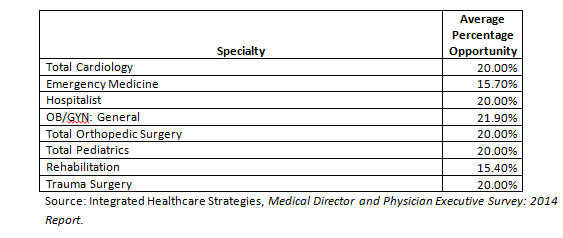While the market gradually moves toward value-based reimbursement, hospital payments to physicians have also been in transition from purely productivity-based pay to incentives based in part on quality, patient experience, and efficiency of care. This shift has taken place in employment, professional service agreements, alternate delivery models, and clinical co-management arrangements, among others. Also included in this list are administrative service positions, such as medical directorships.
The Medical Director and Physician Executive Survey: 2014 Report by Integrated Healthcare Strategies (IHS) indicated that 43 percent of the reporting organizations offered a medical director performance bonus, an increase from 38.2 percent reported in the prior year’s survey. Among the respondents not currently offering such a bonus, 13.2 percent plan to add a performance bonus for medical directors.
Among the respondents to the IHS survey offering a medical director performance bonus, the following table summarizes by specialty the percent of compensation available for performance bonus:

The Physician Compensation and Productivity Survey Report, 2015 Based on 2014 Data by Sullivan, Cotter and Associates (SCA) indicates median quality incentive payments for program or medical directors in the following positions:

The 2015 Medical Directorship and On-Call Compensation Report: Based on 2014 Survey Data by the Medical Group Management Association (MGMA) indicated 32.70 percent of responding providers reported their duties and responsibilities were tied to patient satisfaction, quality of care, and patient safety. Among those reporting medical directorship duties tied to these categories of measures, the reported quality metrics receiving the highest affirmative responses based on the number of reported physicians were as follows: patient satisfaction (66.99 percent), CMS core measures (61.54 percent), and compliance (60.58 percent).
Physicians bring strong clinical leadership to the organization, and those in medical directorship positions are uniquely qualified to have a positive influence the direction of the organization and encourage other providers to achieve organizational goals for quality, patient experience, and effective care. It is incumbent upon hospitals to tie administrative physicians’ goals to those of the organization; linking financial incentives to the achievement of those goals is one—but not the only—way to help ensure success. Best practices also dictate that the medical director assume some level of risk. The takeaway is that financial incentives should be of sufficient amount to be meaningful; however, simply stacking a quality bonus atop a previously-determined hourly rate is not always the correct answer and could create unwanted compliance exposure.
Healthcare laws and regulations mandate fair market value compensation and commercial reasonableness in most arrangements, so selection of experienced healthcare legal counsel and seasoned healthcare valuation analysts is necessary early in the process of establishing quality-based administrative arrangements.
For weekly insights into healthcare, please sign up here:




Leave A Comment